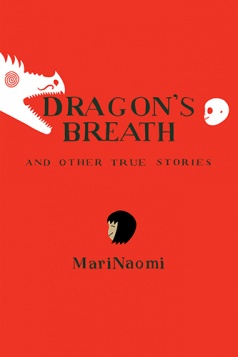This week, we are offering reflections on the six nominees for the 2015 Eisner Award for Best Reality-Based Work, while contemplating larger questions of the variety of ways comics can uniquely crystallize reality for readers.

Written and Illustrated by MariNaomi
Published by Uncivilized Books, softcover, B&W, 382 pages.
In this collection of raw, emotionally honest stories, MariNaomi explores a wide range of topics including youthful rebellion, mortality, disillusionment, and compassion. Many of these stories were first serialized on the popular site the Rumpus. These poignant stories, some filled with hope, others tinged with remorse, are sure to appeal to even the most discerning reader.
Of the list of nominees, MariNaomi’s Dragon’s Breath and Other True Stories most deserves a signal boost, partly because its author has signal boosted others so generously. Indeed, when I met MariNaomi at Alternative Press Expo last October, it was the completely guileless way she showed interest in a random, lone con-goer’s fascination with comics literacy that persuaded me to buy Dragon’s Breath. Her art radiates with the assured (but unassuming) verve of someone who knows herself well enough to have the capacity to be perceptively attuned to others. This autobiographical book exemplifies the kind of elegant minimalism, visually like Porcellino or Satrapi, narratively like Tomine or Barry, that delivers candor and rumination with startling economy. The subjects that ground its realism (bedbugs, leather jackets…) betray MariNaomi’s skill in investing the everyday with profoundly personal, unapologetically subjective significance. And all of it is shot through with pangs of fallible honesty and naked compassion, even for jerks and crooks, and yes, often for herself. Credit also her wit and pacing for giving us immediately, from story one, the sense that we are in deft and practiced hands. The stories ensconce us like the titular puffs of her grandfather’s cigarette smoke, like dragon’s breath, pungent, strange, near, and irresistible.
At the top of the copyright page, in a smirking confession without the self-conscious irony of Chris Ware’s copious marginalia, MariNaomi writes, “These stories are memoir, which means that each one is only as true as the author’s memory is reliable. Small changes have been made to details and sometimes names.” Reality, this underscores, is only as firm as the memory which holds it, because there’s no escape from our perceptual prison cells. The reality upon which this work is based are the rhizomes of memory that MariNaomi curates with crafty self-disclosure. And unlike typical prose memoirs (although MariNaomi uses a good bit of prosaic exposition, which none of the six reality-based nominees avoid), Dragon’s Breath can use empty space, gobs of black backgrounds, iconic representamens, and subtle facework, rather than being confined to the blueprint of tropes expected of a text-only memoir. It seems sometimes as if comics are a more immediate and natural garb for the impressionistic nature of memoir, for those moments that are best spent wordless and without explanation, for the juxtaposition of sense-information and interpretive gloss that actually commingle in our memories, for the stories that resist a canned narrative trajectory or hero’s journey, the truths that have no propositional thesis.
As exemplified by Dragon’s Breath and the aforementioned comparisons, comics have a singular effectiveness in telling those kinds of stories. I would argue, and I wonder if MariNaomi might agree, that this effectiveness is especially necessary for stories of subjectivities overlaid with those identities– racial, ethnic, linguistic, gendered, socioeconomic, etc., and intersectional– that the mainstream has long been deprived (or deprived itself) of. Dragon’s Breath breezily demonstrates that “reality” in comics can be the profoundly personal act of self-revelation through selective and subjective imagism that is often more profoundly “real” than any painstakingly rendered, photographic simulacrum of events.
Next up (tomorrow), the acerbic and hilarious reality of Roz Chast’s “Can’t We Talk about Something More Pleasant?” You can keep up with the entire week’s look at the 2015 Eisner nominations for Best Reality Based Work here.





